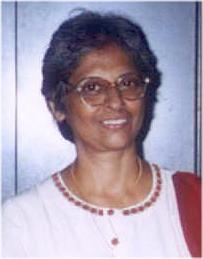Theologians issue call to 'to fulfill the vision of Jesus'
and create 'a discipleship of equals'
By Janina Gomes
Editor's Note: This report of the April 2004 meeting of the Indian Theological Association serves as an introduction to a new series of stories on Global Perspective, Journeys in Theology: Women's Stories. Join us for the next six weeks as we hear women describe their experiences of doing theology in Asia, Africa and Latin America.
MUMBAI, India -- The Indian Theological Association opened up their annual meeting this year to a discussion of "Women's Concerns and an Indian Theological Response."
The result was a rather stark assessment of women's status in Indian society and the church and bold recommendations on how "to free ourselves from the entanglements of enslaving and dehumanizing traditions and to unite ourselves to fashion a new world of solidarity, responsibility and mutuality."
Association leadership said the meeting's reflections and discussions, which were embodied in a concluding statement, could have a profound effect on Indian society and church. A copy of the association's document is available on in the Special Documents section of NCRonline.org.
The document sets the stage of the theologians' reflections by noting that India's male-dominated society is resulting in "alarmingly increasing female feticide." The 2001 national census found an average of 927 girls born for every 1,000 boys, it notes.
"We hear the faint scream of 5 million newborn female babies who are killed every year in our motherland," the theologians began their analysis of the patriarchal culture embedded in the Indian ethos. They wrote, "Many Indian women go through life with fetters that keep them in a perpetual state of subjugation especially in the socio-economic sphere."
As examples, they cited the targeting of women in communal riots, which they said follows a patriarchal understanding that women are the property of men. They also noted that the worst affected groups among women belong to those outside the caste hierarchy such as dalits (former "untouchables") and adviasis (indigenous and tribal groups).
"Marginalized from decision-making processes at all levels and confined within domestic walls, they are unable to make an adequate contribution to society," the theologians said.
Furthermore, the institutionalized system of male domination has been supported by religious beliefs and prescriptions, they noted. But they added, Christianity had promised women a different path.
| E-mail Alerts |
To receive an e-mail notice when Global Perspective is posted every week, sign up here.
Click on the link at the top right of this page to send the column to a friend or colleague.
|
|
"Women experienced wholeness in encountering Jesus," they wrote. "In the Semitic and Graeco-Roman context that saw women as subordinate to men, Jesus made a revolutionary option for women."
"To fulfill the vision of Jesus calls for a new way of being church: a discipleship of equals," the document says. "The communion ecclesiology acknowledged in the Second Vatican Council, paves the way for an egalitarian and participatory model that recovers the traditions of women's discipleship and leadership. Such recapturing seeks to engender both a church-praxis that emancipates and a theology that transforms the patriarchal ecclesial structures and culture."
The Indian theologians asked for "an alternative model of authority and a new understanding of ministry that includes women."
To reach this vision, the theologians called for structural, liturgical and practical changes in the church:
- Creating structures that involve women in the decision-making processes.
- Ensuring "adequate representation" of women on parish and diocesan pastoral councils, finance committees and bishops conference commissions.
- Promoting the participation of women in liturgical celebrations.
- Identifying anti-women texts and avoiding them in liturgy.
- Introducing the assertive women of the scriptures, such as the Daughters of Zelophehad, Deborah, Judith, Queen Vasthi and Mary Magdalene.
- Ensuring women's commissions are adequately funded.
- Ensuring just wages for women who work in the ecclesiastical structures.
The association's statement on women's concerns issued at the end of the meeting is causing ripples throughout the church in India, says association president Fr. Alphonse Sahayam.
The strengthen of the final statement he credited to the participation of a large number of women theologians and the frank and fearless way they expressed themselves and the respect and openness they were listened to by the men present.
The association's secretary Fr. Jacob Parappally agreed with Sahayam. He said the experiences of women theologians as recounted at the conference were an eye opener for many men. He said that some of the men have begun to implement changes in their theologates.
The theological association had concrete recommendations for seminaries and houses of formation, among them:
- To make conscious efforts to replace exclusive masculine symbols and vocabulary for divine-human realities with inclusive models.
- To appoint women professors to seminaries and other formation programs.
- To appoint women councilors and spiritual directors to seminaries and theologates.
- To educate persons in formation on the positive aspects of human love and sexuality and highlighting their beauty and spirituality.
All of India's bishops have also been sent the document, and Parappally said many are sympathetic.
Parappally pointed out that the larger issue is not merely to promote the involvement of women but the involvement of the laity in the decision making process in the church.
He also believes that a conscientized church in India -- with its vast network of schools and social institutions -- could play a vital role in conscientizing Indian society.
Next week, Janina Gomes presents the voices of some of the women behind this historic document.
|
